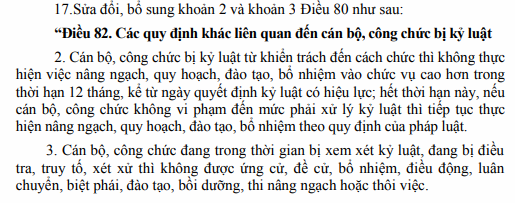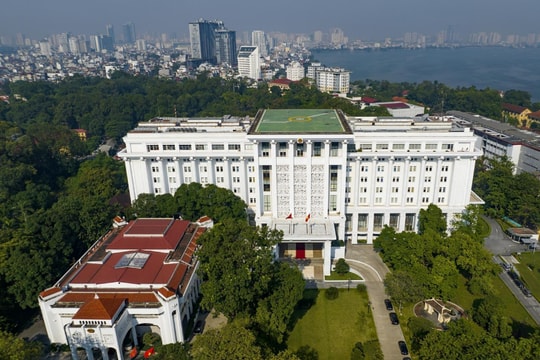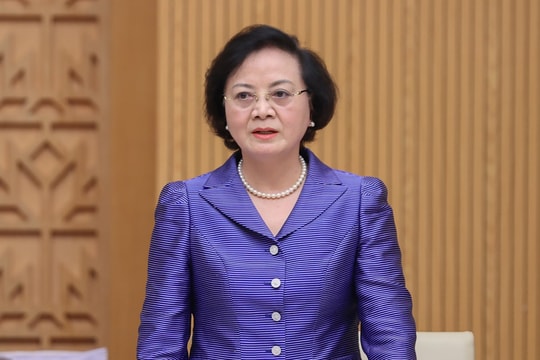Proposal to discipline retired officials who committed violations during their working time
The Ministry of Home Affairs proposed to supplement regulations on disciplinary action against cadres, civil servants and public employees who have retired, quit their jobs or transferred jobs but committed violations during their working time.
The Ministry of Home Affairs is seeking opinions on the draft Law amending and supplementing a number of articles of the Law on Cadres, Civil Servants and the Law on Public Employees. One of the notable contents proposed for amendment is on disciplinary action against cadres, civil servants and public employees.
According to the provisions of the Law on Cadres, Civil Servants and the Law on Public Employees, the statute of limitations for disciplinary action is 24 months from the time of the violation until the discovery of the disciplinary violation. According to the Ministry of Home Affairs, such a statute of limitations is actually too short, not ensuring strictness in handling cadres, civil servants and public employees who have committed violations. Some cases have been disciplined by the Party (or have been criminally prosecuted but given a suspended sentence) when considered for disciplinary action according to the provisions of the Law, the statute of limitations has expired. In addition, some cases of cadres, civil servants and public employees who are Party members have committed violations during their working time but have retired, quit their jobs or transferred out of the state sector or public service sector have been disciplined by the Party and disciplined by the government, so to ensure consistency and synchronization between the provisions, it is also necessary to amend and supplement the law accordingly.
 |
| One of the proposed amendments |
To remedy the above situation, the Ministry of Home Affairs proposes to add Clause 5 to Article 78 and amend Article 79 to regulate discipline for officials and civil servants who have resigned or retired but committed violations during their working time, ensuring consistency with party discipline in order to strictly handle violators. At the same time, amend regulations on disciplinary measures for civil servants to ensure consistency with disciplinary measures for party members, officials or public employees.
The draft law also proposes to amend and supplement Clauses 2 and 3, Article 82, on regulations related to disciplined cadres and civil servants. Accordingly, the draft law proposes to specifically stipulate that disciplined cadres and civil servants shall not be appointed to a higher position, but may still be considered for reappointment or assignment to a lower position; or cadres and civil servants who are in the process of disciplinary review, investigation, prosecution, or trial can still be retired to avoid cases where cadres and civil servants reach retirement age but due to lengthy processing procedures, in some cases taking many years, if retirement procedures are not resolved, it will create difficulties in the process of using cadres and civil servants. In addition, cadres and civil servants who have retired are still considered for disciplinary action or prosecution according to the provisions of law.
Regarding the statute of limitations and the time limit for handling disciplinary actions, the draft law proposes that the statute of limitations for handling disciplinary actions is 60 months from the time of the violation. The statute of limitations for handling disciplinary actions does not apply to the following particularly serious violations: Officials and civil servants currently working or officials and civil servants who, after transferring jobs, retiring, or leaving their jobs, commit serious violations and have been subject to party disciplinary action in the form of expulsion from the party; Violations in internal political protection work; Violations against national interests in the fields of defense, security, and foreign affairs; Use of fake or illegal diplomas, certificates, certifications, or confirmations.
The Ministry of Home Affairs said that all opinions agreed with the addition of disciplinary regulations for retired, retired or transferred officials, civil servants and public employees who committed violations during their working time, in order to seriously institutionalize the Party's policies and guidelines, ensuring discipline, order and strictness of the law. However, there were opinions suggesting considering the scope of application for this subject, accordingly, it should only be applied to those holding certain positions and powers, and not be generalized to all retired, retired or transferred officials, civil servants and public employees.
Therefore, the Drafting Committee asks for the Government's opinion on two options:
Option 1: Disciplinary measures for all cadres, civil servants, and public employees who committed violations during their work and have now resigned or retired and are no longer cadres, civil servants, and public employees.
Option 2: Regulations on disciplinary action against officials and civil servants holding leadership positions from the deputy minister level and equivalent or higher at the central level and vice chairman level and equivalent or higher at the local level who have committed serious violations during their work and have now resigned or retired and are no longer officials and civil servants.
The draft law is being solicited for comments on the Ministry of Home Affairs' Information Portal until March 24, 2019.








